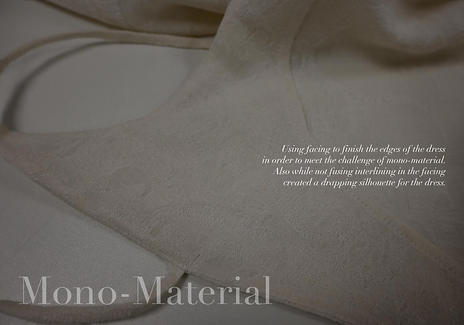Sustainable Solutions
FEmininUS
Project for Sustainable Solutions


"Feminine",
came from the latin origin "Femininus",
which includes the meaning of "she who suckles".
Female bodies are tender, strong and beautiful in different sizes, shapes and colours.
They breed generations and generations just like how the wide ocean bred us in her every tide.
Embrace all kinds of bodies as the ocean held us in,
to know that after all, we are all the same kind,
women,
female,
human.

The aim of the unit Sustainable Solutions is to identify problems that exist in the fashion industry nowadays and to find better, cleaner solutions to solve it.
In this project, I identified the problems of clothings not being able to be recycled; fast fashion and trends that shorten the life cycle of clothings and the fact that producing fit-to-size products created more garment stocks.
unrecyclable
PRObLem
IDentifieD
shorten the life
circle of clothing
created more
garment stocks

mUlti-mateRiaLs
On clOthing
Zippers, buttons, elastic bands... these are the common materials in our daily clothing,
same as interlining, lining and all the different fabrics we use in one garment , we rarely
think about the fact that these are the things that make recycling clothing extremely hard, as we don’t tear up the garment when we recycle it, not to mention the different fibre binding in the thread that woven/knitted in our textile, which separating them could be a huge challenge.
“Globally just 12% of the material used for clothing ends up being recycled. Compare that to paper, glass and plastic PET bottles – which have recycling rates of 66%, 27% and 29% respectively in the US – and it is clear clothing lags behind.”
(Beall, A.(2020).Why clothes are so hard to recycle)
According to research conducted by sociologist Sophie Woodward at the University of Manchester, on average 12% of clothes in the wardrobes of women she studied could be considered “inactive”.
How many times we bought clothing just for an one time occation? How many fancy, trendy clothes we own that were never worn the third time?
Globally, an estimated 92 million tonnes of textiles waste is created each year and the equivalent to a rubbish truck full of clothes ends up on landfill sites every second. By 2030, we are expected as a whole to be discarding more than 134 million tonnes of textiles a year.
(Beall,A.(2020).Why clothes are so hard to recycle)

TRendy
DeSign
In the production of garments, there’s a certain order quantity that brands have to meet with the factories, even for the unpopular sizes with lower demands. The more measurement options the brand product, the more likely that there will be stocks left for the relatively unpopular sizes such as 2XS or 3XL, and will soon become overstock, which is not a good news both financially and environmentally.
Globally, around 20% of clothing remains unsold, each year out of more than 100 billion pieces.
(Baeten, C.(2022) 5 sustainable solutions to fashion overstock in 2022)

Fit-to-Size
gaRmentS

DeSign
KeywORDS
timeless
ageless
mono-material
size free
identity

It is a high end apparel designing for all women in different body types and different age. Communicated with photography and videos with different women in the same dress.
We are all unique and beautiful in our different way,
I want to make design that embrace every female, every body.







SOlUtionS fOR
mOno-mateRial






:: Sustainable Solutions::
2022
Manchester, UK
photo/ Alice Liu
model/ Alice Liu, Camila Torres Suarez
Mistura Adeoye, Martha LeBeau
tutor/ Sarah Collins,
Becky De Lacy
